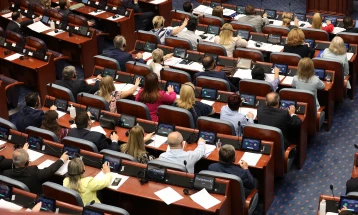EBRD presents its flagship Transition Report in Skopje
- Industrial policies have seen a resurgence, seeking to address market failures such as environmental degradation. Their growing popularity is shaped primarily by domestic political economy considerations and rising geopolitical tensions. While industrial policies are typically employed by higher-income economies, they are also now used more frequently in economies with less administrative and fiscal capacity to implement them, assessed the European Bank for Reconstruction and Development (EBRD), in its latest flagship Transition Report 2024-25: navigating industrial policy, presented on Monday.
- Post By Silvana Kocovska
- 14:12, 19 May, 2025

Skopje, 19 May 2025 (MIA) - Industrial policies have seen a resurgence, seeking to address market failures such as environmental degradation. Their growing popularity is shaped primarily by domestic political economy considerations and rising geopolitical tensions. While industrial policies are typically employed by higher-income economies, they are also now used more frequently in economies with less administrative and fiscal capacity to implement them, assessed the European Bank for Reconstruction and Development (EBRD), in its latest flagship Transition Report 2024-25: navigating industrial policy, presented on Monday.
According to EBRD Head of North Macedonia, Fatih Turkmenoglu, North Macedonia has made impressive strides in its green transition, infrastructure development, and expanding access to finance for businesses and individuals, the EBRD said in a press release.
“These achievements reflect the strength of our partnerships with local stakeholders, donors, and the private sector. The newly adopted EBRD Country Strategy for 2025–2030 builds on this progress, with clear priorities around regional integration, sustainable infrastructure, and fostering a more competitive and inclusive economy. As outlined in the EBRD’s 2024–25 Transition Report, Navigating Industrial Policy, industrial policy can play a critical role in shaping a country’s long-term competitiveness and resilience. In North Macedonia, our investments aim to create meaningful opportunities that encourage people to build their futures at home - supporting inclusive growth and helping to address demographic challenges. I am optimistic about the road ahead and committed to delivering even greater impact in the coming years,” Turkmenoglu said.
National Bank Governor, Anita Angelovska Bezhoska stated that the free economic zones, as a core industrial policy tool, have played a positive role in attracting foreign firms, creating jobs and increasing productivity in the Macedonian economy. They have attracted above 1 billion EUR in cumulative FDI over the past decade, they account for about 50% of total exports and are home to some of the most productive firms in the country.
“It is also evident that these companies have positive effects on the balance of payments, generating net foreign exchange inflows of 17.8% of GDP in 2014-2023 period according to NB estimates. But the benefits can be higher if knowledge transfer, technological diffusion and connections between foreign investors and local businesses are strengthened-currently it is estimated that zone-based firms source only about 10% of their inputs from Macedonian local firms,” Angelovska-Bezhoska said.
The EBRD is the leading institutional investor in North Macedonia and has invested more than €2.9 billion in 198 projects.
Photo: EBRD







